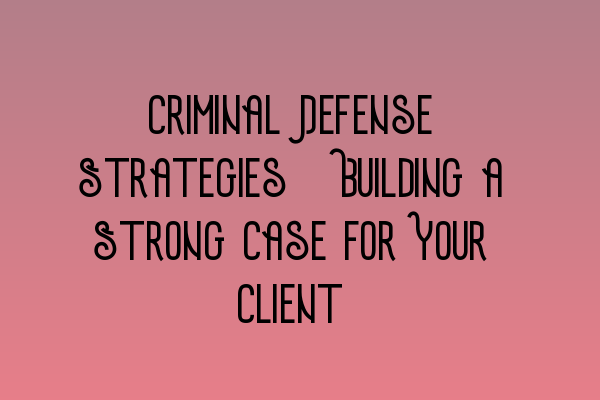Criminal Defense Strategies: Building a Strong Case for Your Client
As a criminal defense solicitor, your role is to provide expert legal representation to clients who are facing criminal charges. Your primary goal is to build a strong case that will effectively defend your client’s rights and secure the best possible outcome.
In order to achieve this, it is essential to develop effective criminal defense strategies that are tailored to the unique circumstances of each case. These strategies involve a combination of legal knowledge, investigative skills, and persuasive arguments that aim to cast doubt on the prosecution’s case.
Here are some key strategies that can help you build a strong defense for your client:
1. Thorough Case Investigation
One of the first steps in building a strong defense is to conduct a thorough investigation of the case. This involves reviewing all available evidence, including police reports, witness statements, forensic analysis, and any other relevant documentation.
By carefully examining the evidence, you can identify any inconsistencies, errors, or alternative explanations that may challenge the prosecution’s version of events. This information can be used to build a strong defense strategy that raises reasonable doubt in the minds of the jury.
2. Legal Expertise
As a solicitor, it is crucial to have a deep understanding of criminal law and procedure. Familiarize yourself with the relevant statutes, case law, and legal precedents that are applicable to your client’s case.
By having a comprehensive knowledge of the law, you can identify potential legal issues or defenses that may apply to your client’s situation. This expertise allows you to make persuasive arguments and present compelling legal reasoning to challenge the prosecution’s case.
3. Witness Testimony
Witness testimony plays a crucial role in criminal defense cases. Identifying and interviewing potential witnesses can provide valuable insights and evidence that may support your client’s defense.
Expert testimonies can also be instrumental in building a strong case. By engaging experts in relevant fields such as forensics, psychology, or any other applicable area, you can present scientific evidence and professional opinions that cast doubt on the prosecution’s case.
4. Negotiation and Plea Bargaining
In some cases, it may be advantageous to negotiate with the prosecution to secure a favorable plea bargain. This can result in reduced charges, lesser penalties, or dismissal of certain charges altogether.
While plea bargaining is not suitable for every situation, it can be a strategic approach to resolve a case without the need for a trial. By carefully assessing the strengths and weaknesses of the prosecution’s case, you can negotiate from a position of strength and secure the best possible outcome for your client.
5. Effective Presentation and Advocacy
The success of your defense strategy heavily relies on your ability to present a compelling case in court. This involves effective oral advocacy skills, strong written submissions, and the ability to challenge the prosecution’s evidence during cross-examination.
Using clear and persuasive language, you must effectively communicate your client’s version of events and present a coherent narrative that supports their innocence or reasonable doubt. Your courtroom demeanor, tone, and presentation style also contribute to the overall impression you make on the judge and jury.
Conclusion
Building a strong defense for your client requires a combination of legal expertise, investigative skills, and persuasive advocacy. By thoroughly investigating the case, leveraging legal knowledge, engaging relevant witnesses and experts, considering negotiation or plea bargaining, and presenting a compelling case, you can effectively defend your client’s rights and achieve the best possible outcome.
For more information on related topics, please check out the following articles:
- Legal Representation for Delaware LLCs in the UK: Expert Advice
- SQE Exam Prep: Essential Study Materials for Aspiring Solicitors
- Expert Testimonies in UK Courts: Building Strong Cases
- Demystifying the Solicitors Qualifying Examination Format
- SQE Exam for International Lawyers: Challenges and Success Strategies
